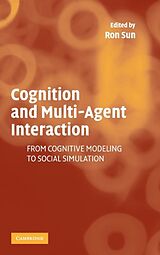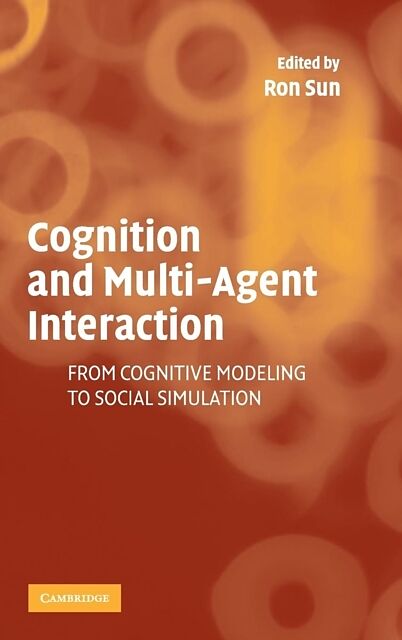Cognition and Multi-Agent Interaction
Einband:
Fester Einband
EAN:
9780521839648
Untertitel:
From Cognitive Modeling to Social Simulation
Autor:
Ron (Rensselaer Polytechnic Institute, New Yo Sun
Herausgeber:
Cambridge University Press
Anzahl Seiten:
450
Erscheinungsdatum:
19.03.2015
ISBN:
0521839645
This book explores the intersection between individual cognitive modeling and modeling of multi-agent interaction.
Informationen zum Autor Ron Sun is Professor of Cognitive Science at Rensselaer Polytechnic Institute. A well known researcher in cognitive science! Ron Sun leads projects investigating fundamental structures of the human mind. In particular! he recently published a book entitled 'Duality of the Mind'! exploring the interaction of implicit and explicit cognition. He is also the founding co-editor-in-chief of the journal 'Cognitive Systems Research' Klappentext Explores the intersection between individual cognitive modeling and modeling of multi-agent interaction. Zusammenfassung This book explores the intersection between cognitive sciences and social sciences. In particular! it explores the intersection between individual cognitive modeling and modeling of multi-agent interaction (social stimulation) and that the interaction may be more significant than either alone. Inhaltsverzeichnis Part I. Introduction: 1. Prolegomena to integrating cognitive modeling and social simulation Ron Sun; Part II. Overviews of Cognitive Architectures: 2. Modeling paradigms in ACT-R Niel Taatgen, Christian Lebiere and John Anderson; 3. Considering Soar as an agent architecture Robert Wray and Randolph M. Jones; 4. The CLARION cognitive architecture: extending cognitive modeling to social simulation Ron Sun; Part III. Modeling and Simulating Cognitive and Social Processes: 5. Cognitive architectures, game playing, and human evolution Robert West, Christian Lebiere, and Dan Bothell; 6. Simulating a simple case of organizational decision making Isaac Naveh and Ron Sun; 7. Cognitive modeling of social behaviors William J. Clancey, Maarten Sierhuis, Bruce Damer, and Boris Brodsky; 8. Cognitive agents interacting in real and virtual worlds Brad Best and Christian Lebiere; 9. Modeling social emotions and social attributions Jonathan Gratch, Wenji Mao, and Stacy Marcella; 10. Communicating and collaborating with robotic agents J. Gregory Trafton, Alan C. Schultz, Nicholas L. Cassimatis, Laura M. Hiatt, Dennis Perzanowski, Derek P. Brock, Magdalena D. Bugajska, and William Adams; 11. Behavior-based methods for modeling and structuring control of social robots Dylan Shell and Maja Mataric; 12. Evolution of a teamwork model Nathan Schurr, Steven Okamoto, Rajiv T. Matheswaran, and Milind Tambe; 13. Sociality in embodied neural agents Domenico Parisi and Stefano Nolfi; 14. Cognitive architecture and contents for social structures and interactions Cristiano Castelfranchi; Part IV. A Symposium: 15. Cognitive science and good social science Scott Moss; 16. Collective cognition and emergence in multi-agent systems Pietro Panzarasa and Nick Jennings; 17. Social judgement in multi-agent systems Tom Burns and Ewa Roszkowska; 18. Including human variability in a cognitive architecture to improve team simulation Frank Ritter and Emma Norling; 19. When does social simulation need cognitive models? Nigel Gilbert....
Zusammenfassung
This book explores the intersection between cognitive sciences and social sciences. In particular, it explores the intersection between individual cognitive modeling and modeling of multi-agent interaction (social stimulation) and that the interaction may be more significant than either alone.
Inhalt
Part I. Introduction: 1. Prolegomena to integrating cognitive modeling and social simulation Ron Sun; Part II. Overviews of Cognitive Architectures: 2. Modeling paradigms in ACT-R Niel Taatgen, Christian Lebiere and John Anderson; 3. Considering Soar as an agent architecture Robert Wray and Randolph M. Jones; 4. The CLARION cognitive architecture: extending cognitive modeling to social simulation Ron Sun; Part III. Modeling and Simulating Cognitive and Social Processes: 5. Cognitive architectures, game playing, and human evolution Robert West, Christian Lebiere, and Dan Bothell; 6. Simulating a simple case of organizational decision making Isaac Naveh and Ron Sun; 7. Cognitive modeling of social behaviors William J. Clancey, Maarten Sierhuis, Bruce Damer, and Boris Brodsky; 8. Cognitive agents interacting in real and virtual worlds Brad Best and Christian Lebiere; 9. Modeling social emotions and social attributions Jonathan Gratch, Wenji Mao, and Stacy Marcella; 10. Communicating and collaborating with robotic agents J. Gregory Trafton, Alan C. Schultz, Nicholas L. Cassimatis, Laura M. Hiatt, Dennis Perzanowski, Derek P. Brock, Magdalena D. Bugajska, and William Adams; 11. Behavior-based methods for modeling and structuring control of social robots Dylan Shell and Maja Mataric; 12. Evolution of a teamwork model Nathan Schurr, Steven Okamoto, Rajiv T. Matheswaran, and Milind Tambe; 13. Sociality in embodied neural agents Domenico Parisi and Stefano Nolfi; 14. Cognitive architecture and contents for social structures and interactions Cristiano Castelfranchi; Part IV. A Symposium: 15. Cognitive science and good social science Scott Moss; 16. Collective cognition and emergence in multi-agent systems Pietro Panzarasa and Nick Jennings; 17. Social judgement in multi-agent systems Tom Burns and Ewa Roszkowska; 18. Including human variability in a cognitive architecture to improve team simulation Frank Ritter and Emma Norling; 19. When does social simulation need cognitive models? Nigel Gilbert.

Leider konnten wir für diesen Artikel keine Preise ermitteln ...
billigbuch.ch sucht jetzt für Sie die besten Angebote ...
Die aktuellen Verkaufspreise von 6 Onlineshops werden in Realtime abgefragt.
Sie können das gewünschte Produkt anschliessend direkt beim Anbieter Ihrer Wahl bestellen.
Loading...
Die aktuellen Verkaufspreise von 6 Onlineshops werden in Realtime abgefragt.
Sie können das gewünschte Produkt anschliessend direkt beim Anbieter Ihrer Wahl bestellen.
| # | Onlineshop | Preis CHF | Versand CHF | Total CHF | ||
|---|---|---|---|---|---|---|
| 1 | Seller | 0.00 | 0.00 | 0.00 |
